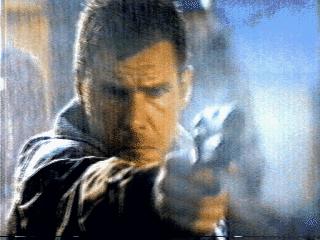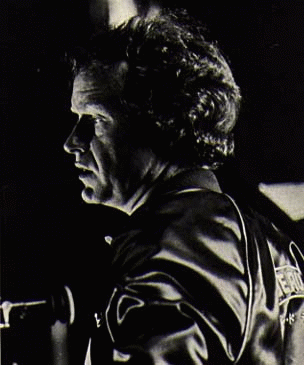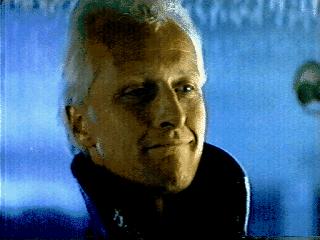- Director:
- Ridley Scott
- Starring:
-
Harrison Ford (Deckard)
Rutger Hauer (Roy Batty)
Sean Young (Rachael) Edward James Olmos (Gaff) - Cinematographer:
- Jordan Cronenweth
- Music:
- Vangelis
- Visual Futurist (creative designer):
- Syd Mead
- Producer:
- Michael Deeley
- Origin:
- US 1982 (Director´s cut, 1992)
Early in the 21st Century, THE TYRELL
CORPORATION advanced Robot evolution
into the NEXUS phase -- a being virtually
identical to a human -- known as a replicant.
The NEXUS 6 Replicants were superior
in strength and agility, and at least equal
in intelligence, to the genetic engineers
who created them.
Replicants were used Off-world as
slave labor, in the hazardous exploration and
colonization of other planets.
After a bloody mutiny by a NEXUS 6
combat team in an Off-world colony,
Replicants were declared illegal
on earth -- under penalty of death.
Special police squads -- BLADE RUNNER
UNITS -- had orders to shoot to kill, upon
detection, any trespassing Replicants.This was not called execution.
It was called retirement.LOS ANGELES
NOVEMBER, 2019

One of the most popular sci-fi cult movies of the history, Blade Runner is a strange mixture of western and film noir that survives all of its contradictions, production problems and conflicts among those involved in its making. With a director wanting to do one thing, producers demanding something else and actors questioning the whole plot, the commercial succes of Blade Runner was not to be. However, this film, wich failed at the theaters on its 1982 release, became a milestone for a great number of movies afterwards.
Obscure and dense, most of the messages inside the film go unnoticed by a reckless viewer, but a careful revision of the movie makes the mind go wild about the why´s of that fiction... and since those why´s are easily taken to this thing we all call real life, we have a vigorous questioning about our own humanity and our participation in the ongoing plot of LIFE itself.
Most of the text and images in this page has come from several sites on the net, I don´t quite remember all. So, my apologies if I don´t give you the right credit, folks. I´ll make it up to you somehow, I promise. :)

"They say you are a good policeman...
Are you a good man?"Ridley Scott made BR in a style called "film noir". Film noir is a "hardboiled detective" style of story-telling. Perhaps the most famous example is the Humphrey Bogart movie "The Maltese Falcon" (directed by John Huston). A trademark of film noir is the voice-overs by the detective, explaining what he is thinking/doing at the time.
Ridley Scott filmed BR *without* the voice-overs, but due to its poor reception at a sneak previews, the studio insisted that the voice-overs be added. Ridley Scott said in an interview on American television that in film noir, voice-overs sometimes work, and sometimes don't, and they didn't work in BR.
"(A)n extensive voice-over was added to help people relate to Harrison Ford's character and make following the plot easier. (A)fter a draft by novelist- screenwriter Darryl Ponicsan was discarded, a TV veteran named Roland Kibbee got the job. As finally written, the voice-over met with universal scorn from the filmmakers, mostly for what Scott characterized as its 'Irving the Explainer' quality.... It sounded so tinny and ersatz that, in a curious bit of film folklore, many members of the team believe to this day that Harrison Ford, consciously or not, did an uninspired reading of it in the hopes it wouldn't be used. And when co-writers Fancher and Peoples, now friends, saw it together, they were so afraid the other had written it that they refrained from any negative comments until months later." [Source: Los Angeles Times Magazine, September 13, 1992.]
The ending of the film was also changed by the studio. Scott wanted to end the film with Deckard and Rachael getting into the elevator, but the studio decided that the film needed a happier, less ambiguous ending. The aerial shots used in the 1982 theatrical release were outtakes from Stanley Kubrik's "The Shining" (which, coincidentally, featured Joe Turkel).
In September 1992, Warner Bros. released "The Director's Cut" of Blade Runner (BRDC), which eliminated the voice-overs and the happy ending.
 Blade Runner is LOOSELY based on a Philip K. Dick novel, "Do Androids Dream
of Electric Sheep" (DADoES). The least one can say about the film adaptation
is that it borrowed a number of concepts and characters from the book.
Blade Runner is LOOSELY based on a Philip K. Dick novel, "Do Androids Dream
of Electric Sheep" (DADoES). The least one can say about the film adaptation
is that it borrowed a number of concepts and characters from the book.
Dick also wrote the short story that "Total Recall" was based on, "We Can Remember It For You, Wholesale". A recurring theme in Dick's work is the question of personal and human identity. A question explored more in DADoES and "Total Recall" than in Blade Runner is "what is reality?"
You are listening to the Blade Runner´s theme by Vangelis
(Evangelos Papathanassiou): Greek Composer. He has written numerous movie scores, perhaps the most famous being for "Chariots of Fire". Also wrote some of the music for the TV series "Cosmos". Prior to writing movie scores, Vangelis was the keyboard player of the band "Aphrodite's Child". Vangelis also wrote the score for Scott's 1992 film: "1492".

If you ever get tired of the music, you can stop it with the controls further below.
Behind the Scenes
 RIDLEY SCOTT:
Director. A veteran television commercial maker, Scott
consistently makes quality movies. His feature-film credits include: The
Duellists, Alien, Blade Runner, Someone to Watch Over Me, Legend, Black Rain,
Thelma and Louise, 1492. Ridley Scott also directed the first ever Macintosh
television advertisement (the "hammer thrower") which first aired during the
Superbowl in January 1984. Ridley's brother Tony is also a director, and his
film credits include Top Gun, Days of Thunder, The Hunger, True Romance, and
The Last Boyscout.
RIDLEY SCOTT:
Director. A veteran television commercial maker, Scott
consistently makes quality movies. His feature-film credits include: The
Duellists, Alien, Blade Runner, Someone to Watch Over Me, Legend, Black Rain,
Thelma and Louise, 1492. Ridley Scott also directed the first ever Macintosh
television advertisement (the "hammer thrower") which first aired during the
Superbowl in January 1984. Ridley's brother Tony is also a director, and his
film credits include Top Gun, Days of Thunder, The Hunger, True Romance, and
The Last Boyscout.
"The BLADE RUNNER script was a great screen play and, oddly enough, a similar thing happened with ALIEN. When ALIEN came in out of the blue, I thought it was a wonderful script and I keyed in what I thought could be done with it--I saw it totally. Michael Deeley brought BLADE RUNNER to me when I was finishing ALIEN. At the time I was reading the screen play, I thought it was very interesting, but thought,'Oh, science fiction again.' Then while I was preparing something else, the BLADE RUNNER screenplay stayed in my mind. I kept thinking it wasn't really science fiction at all. In a funny kind of way, it was a rather contemporary movie. So I went back to Michael and said, 'Lets do it.'
"Going through cities like Chicago or New York on a bad winter afternoon, you get a sense of the city on overload. And even going through the modern sections that have just been put up, there's rubbish and there are bigger and bigger buildings going up. Essentially the city is becoming more and more dwarfed by the environment.
"Fashions aren't going to be changing that drastically in forty years. I think that's always a disasterous mistake that filmmakers fall into--the diagonal zippers and silver hair syndrome. When you do a futuristic story, unless you're going to leap forward 100, 200, 300 years you're not going to see that drastic a change. Certainly not in forty years.
"When we set out to do this film, we decided to make 'android' a taboo word. I said anybody who uses the word 'android' gets their head broken with a baseball bat. The word sets up all sorts of preconceptions of the kind of film this could be. An android might be human, actually flesh and blood, gentically structured, but we simply decided not to use the word because its over-used and misused. So we developed our own word, which is the word 'replicant.'
 "A replicant is essentially a human being, an all-flesh culture, that is very
advanced and highly perfected. That's the odd dichotomy of the whole story.
The detective's job is to be a kind of policeman but also an exterminator, if
necessary. His job is to hunt replicants who happen to find their way into
the city.
"A replicant is essentially a human being, an all-flesh culture, that is very
advanced and highly perfected. That's the odd dichotomy of the whole story.
The detective's job is to be a kind of policeman but also an exterminator, if
necessary. His job is to hunt replicants who happen to find their way into
the city. They have no right to be there because the replicants were originally developed for offworld situations, military, industrial, mining.
They are kind of a second-class generation developed for inhospitable environments and dangerous or boring work. There may come a time when, if we're sending an astronaut off into deep space and know he'll never come back, we may want to send a replicant instead.
"Before the film, I spent a little bit of time with the actors finding a level and dimension on their characters. After a fair amount of discussion, the actor starts to key in on what he feels would be right for himself with what I want, and starts forming it himself along that route. It's almost like a sculpting process. You gradually build up the character as you go. I also find it usefull to write out a biography of each character--it helps give the actor a direction.
 "I spent time explaining to Rutger and Brion how the replicants were
orginally designed and what duties they would have performed. Almost like
giving them a plotted history of how science had developed up this particular
point and what uses had been found for what had essentially become a
second-class generation. They started to key in on that and argue about it.
As soon as you get an actor arguing about something, then you know you're
getting somewhere.
"I spent time explaining to Rutger and Brion how the replicants were
orginally designed and what duties they would have performed. Almost like
giving them a plotted history of how science had developed up this particular
point and what uses had been found for what had essentially become a
second-class generation. They started to key in on that and argue about it.
As soon as you get an actor arguing about something, then you know you're
getting somewhere."I think a lot of directors are suddenly realizing that special effects films don't necessarily mean crappy movies. The word 'special effects' is frequently associated with lousy horror movies. But now I think good effects movies are attracting a different level of director. Directors and producers are beginning to realize that special effects are simply tools to make a good film, a very necessary part. Unless the director gets involved in them, he's gambling. The director has got to have input or he'll get the wrong effects."
MICHAEL DEELEY: Producer. Academy Award winner for producing "The Deer Hunter"
SYD MEAD: Visual Futurist. Syd Mead suggested the term "visual futurist" over his credit in the movie. (As he is not a union/guild member, he could not use credits such as "creative designer".) He has been co-sponsoring an International Student Design Competition with Sony since 1989. Some of his works are:
California Pavilion, Seville Expo (1992)
Future Terminal, for Japan Railways East (1990)
Club Car, for Japan Railways East (1990)
Dr. Jeekans [This is futuristic cafe/video arcade in Tokyo.] (1990)
Office for the Future, for Okamura Furniture Co, Japan (1989)
Club House (Tokyo Bayside Project) (1989)
Tron Computer (1988)
San Rio Theatre (1987)
Office of the Future, for GE (1985)
Terraforming (video game)
Civilization (video game)
LAWRENCE G. PAULL: Production Designer. Holds degrees in Architecture and City Planning, his feature-film credits include: Blue Collar, Which Way Is Up?, and The Star Spangled Girl.
HAMPTON FANCHER, DAVID PEOPLES: Screenplay writers. Peoples wrote Clint Eastwood's "Unforgiven", and Stephen Frear's "Hero".
JORDAN CRONENWETH: Cinematographer. Altered States, Best Friends (1982), Cutter's Way, Final Analysis, Gable and Lombard, Gardens of Stone, Just Between Friends, The Nickel Ride, Peggy Sue Got Married (AAN), Play It As It Lays, Rolling Thunder, State of Grace, Stop Making Sense.
DOUGLAS TRUMBULL: Special Effects. 2001: A Space Odyssey, Close Encounters of the Third Kind, Brainstorm (also directed).

I've seen things you people wouldn't believe.
Attack ships on fire off the shoulder of Orion.
I watched C-beams glitter in the dark
near the Tannhauser gate.
All those moments will be lost in time,
like tears in rain.
Time to die.
You can hear this inspirated and out of the blue speech (he just improvised it) by adjusting the music with the top control and starting the wav in the bottom one.Music Voice On Screen
DECKARD (Harrison Ford): Ex-Blade Runner.DR ELDON TYRELL (Joe Turkel): Owns the Tyrell Corp. and manufactures replicants. Extremely intelligent, designed the NEXUS 6 brain.
RACHAEL (Sean Young): Experimental NEXUS 6 replicant. Works for Tyrell and has his niece's memories.
ROY BATTY (Rutger Hauer): Leader of the renegade replicants. INCEPT DATE: 8 Jan, 2016 FUNCTION: Combat, Colonization Defense Prog PHYS: A MENT: A
PRIS (Daryl Hannah): Replicant, (Bryant: "Yer standard pleasure model") INCEPT DATE: 14 Feb, 2016 FUNCTION: Military/leisure PHYS: A MENT: B
ZHORA (Joanna Cassidy): Replicant. INCEPT DATE: 12 June, 2016 FUNCTION: Retrained (9 Feb, 2018) Polit. Homicide PHYS: A MENT: B
LEON KOWALSKI (Brion James): Replicant. INCEPT DATE: 10 April, 2017 FUNC: Combat/loader (Nuc. Fiss.) PHYS: A MENT: C
J.F. SEBASTIAN (William Sanderson): Genetic designer for the Tyrell Corporation. Still on Earth because of progeria, a premature geriatricism (Methuselah's Syndrome). A grand-master in chess (according to one script) but has defeated Tyrell only once.
H. BRYANT (M. Emmett Walsh): Inspector of the police force, Deckard's former boss.
GAFF (Edward James Olmos): A member of the police force. A sartorial dandy bucking for promotion; makes origami.
HOLDEN (Morgan Paull): Blade Runner, shot by Leon and put on life support.

Links 
2019: Off-World 
Blade Runner FAQ Home Page © 1996 cychess@mail.internet.com.mx

